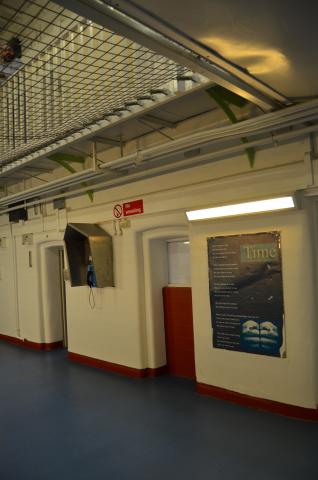Anna Schliehe Blog 2

Missing people and the pains of entry in the UK
When researching entry into and release from custody in prisons in England over the last 10 months, one aspect of entry into custody surfaced in many interviews, and that is how people in police custody and prison become ‘missing people’. Talking to the ‘missing’ involves a form of absent presence: prisoners describe how they live for days, sometimes weeks, without anyone knowing where they are. They are not technically missing in a geographical sense involving unusual cartographies and movements of absence (Parr et al 2015: 192) but rather in a static sense. This form of ‘static’ missing means prisoners are missing in a confined space without the chance of defining their absence through movement.
From the perspective of the left behind, living with absence is of a particular nature when carceral spaces are involved. Initially, the process of ‘missing’, as described by prisoners who cannot contact ‘the left behind’, is ‘absolute’ in the sense that there is no channel of communication. Usually, prisoners are allowed one short phone call when they enter custody but many report difficulties in reaching people, remembering phone numbers, not being allowed to access prison phones, or being too distressed initially to use them. Some of our interviewees tell us of extreme levels of stress and anxiety related to being cut-off and technically ‘missing’. This state of ‘absolute’ missing can last from hours to a couple of days to a couple of weeks, depending on the prison regime, particular officers or other prisoners trying to help and the speed with which the phone list with authorised numbers is confirmed. Being missing, in this sense, is part of the pains of entry that many prisoners experience in their early days in custody.
This preliminary state of ‘absolute missing’ changes over the course of someone’s stay in prison. The ‘absolute’ morphs into the ‘liminal’ when prisoners get on-and-off contact to their family and friends. Parr and Stevenson (2015: 307) describe how the feeling of loss when someone goes missing can be experienced as traumatic or as a time of ‘limbo’ – for prisoners’ loved-ones this limbo continues in a different way. Families cannot phone their imprisoned mother, father, partner or child: they sit waiting (Foster 2016). In a deeply moving and personal talk, Soozy described her experiences as the partner of an IPP prisoner to us last week at the Prisons Research Centre. She explained how, when the phone call ends, her partner essentially goes missing temporarily: she has no way of knowing how he is feeling, what situations he might be confronted with, if he might be moved, if he might need help; causing great anxiety and a sense of limbo. Her descriptions mirror a lot of what Parr and Stevenson (2015) write about in ‘no news today’ regarding the painful act of regularly enquiring about their loved ones at the police, or in Soozy’s case within the prison service. Though different to the ‘missing’ that Parr et al (2015) describe, many prisoners and the ones they left behind can relate to being ‘differently absent’ and experiencing ambiguous loss ‘as a result of human absence’ (Parr and Stevenson 2015: 307).

I wanted to highlight this element of the prisoner experience that I initially noticed as a ‘pain of entry’ in the UK. Research into prisoners’ families (like Foster 2016 and others) has highlighted how this extends beyond the confines of the prison and reaches into many homes across the country. Different stages of ‘missing’ are part of many experiences of imprisonment from entry, exit to post-release, even though they might be most severe in the early days in custody.
Dr Anna Schliehe is a Research Associate in the COMPEN team, Institute of Criminology, University of Cambridge.
Soozy is on twitter: @soozy_thom
The project on geographies of missing people is online under: http://www.geographiesofmissingpeople.org.uk
Foster, R (2016) 'Doing the wait': an exploration into the waiting experiences of prisoners' families. Time & Society (advance publication February 21) doi: 10.1177/0961463X1663323. P. 1-19.
Parr, H; Stevenson, O (2015) ’’No news today’: talk of witnessing with families of missing people’. Cultural Geographies Vol 22(2). P. 297-315.
Parr, H; Stevenson, O; Fyfe, N; Woolnough, P (2015) ‘Living absence: the strange geographies of missing people. Environment and Planning D: Society and Space Vol 33. P. 191-208.
